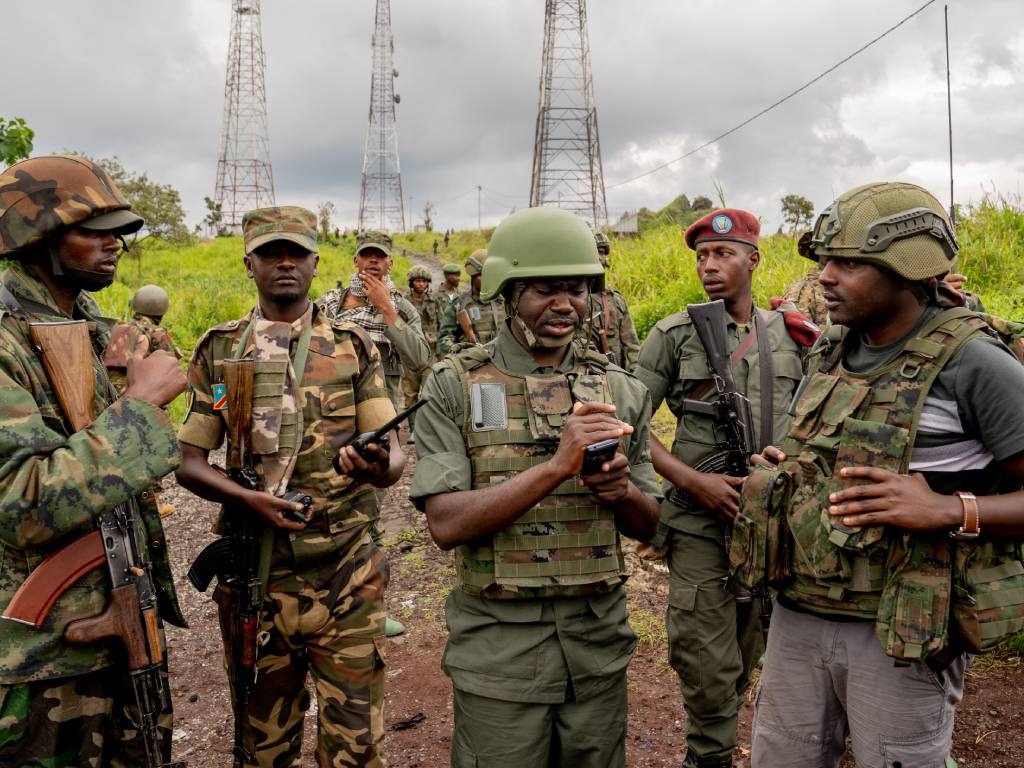

M23 rebels talk before leaving their position in Kibumba in eastern Democratic Republic of Congo.
Glody Murhabazi/AFP
- A ceasefire in eastern DRC is set to last for 72 hours, allowing rebels to withdraw from the strategic city of Mushaki.
- Violence there has been seen as a real threat to credible elections on 20 December.
- The DRC’s information minister urged candidates to speak against violence during their campaigns.
A ceasefire came into effect on Tuesday in the eastern parts of the Democratic Republic of Congo (DRC) as the country prepares for watershed elections on 20 December.
There are concerns that instability in the east, where M23 rebels (which Rwanda denies backing) and other smaller militia groups known as the Mai Mai operate, could affect the credibility of polls.
DRC President Felix Tshisekedi and his Rwandan counterpart Paul Kagame are at loggerheads over the crisis in eastern DRC.
As part of peacebuilding last month, the US dispatched its Director of National Intelligence, Avril Haines, to both countries for separate meetings with the heads of state.
It’s due to those meetings that the 72-hour peace deal, with the possibility of extension, was agreed on.
According to the ceasefire agreement, armed groups downed their weapons for the withdrawal of forces occupying the locality of Mushaki and the RP1030 road between Kirolwire and Kitchanga.
READ | How the DRC’s crucial 20 December elections will work
A week ago, M23 rebels took control of Mushaki, a strategic town in Masisi territory, North Kivu, edging closer to their main objective of cutting off key routes to the provincial city of Goma.
Had they marched on, it could have likely forced the postponement of elections.
US National Security Council spokesperson Adrienne Watson said America was closely monitoring the ceasefire.
“The US government will use its intelligence and diplomatic resources to monitor the activities of armed forces and non-state armed groups during the ceasefire,” she said.
The M23 rebels said they would abide by the peace treaty but, if attacked, would not hesitate to retaliate.
M23 spokesperson Lawrence Kanyu said the rebels wanted to “give a chance to a peaceful resolution to the conflict in eastern DRC”.
Government spokesperson and DRC Communication and Media Minister Patrick Muyaya urged all candidates heading into various levels of the general election to speak against conflict and promote peace.
Muyaya said in a statement:
No manoeuvre aimed at disrupting the smooth running of the current electoral process will be tolerated. Invitation is made to political parties as well as candidates to contribute, through their behaviour, to the preservation of public order.
Tshisekedi is crisscrossing the country in a bid to be voted for a second term. The major concerns for his second term, if successful, are peace and security.
Addressing a rally in Mbuji Mayi yesterday, he vowed to capacitate the army and police.
“We must integrate the army and the police to ensure and protect the territorial integrity of our country. During my second term, we will improve the conditions of our soldiers and police,” he promised.
Vulnerable communities are bearing the brunt of deaths, sexual violence, humanitarian crises and displacement due to the crisis in eastern DRC.
Since the beginning of 2023, nearly 1 million people have been displaced, with over 900 000 displaced in North Kivu alone since March 2022, when fighting erupted.
The News24 Africa Desk is supported by the Hanns Seidel Foundation. The stories produced through the Africa Desk and the opinions and statements that may be contained herein do not reflect those of the Hanns Seidel Foundation.
